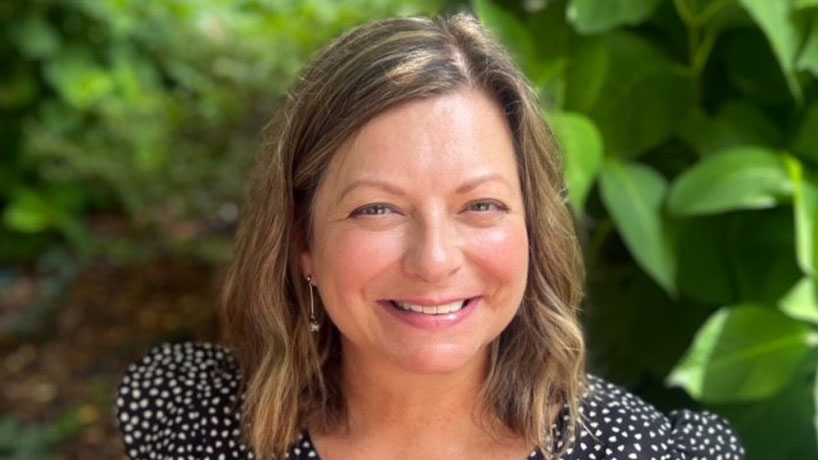
On a recent trip to Scotland, Kristine Stewart-Perkins, an assistant teaching professor in UMSL’s College of Nursing, ended up assisting a passenger in need for the majority of the flight. (Photo courtesy of Kristine Stewart-Perkins)
After a bumpy start including a missed flight, a misplaced passport and lots of back and forth with airline booking agents, Kristine Stewart-Perkins was finally on the plane and settling into her 30th anniversary trip to Scotland with her family.
But she was only about an hour into the flight to London when her husband tapped her on the shoulder to say that the flight attendants were looking for a medical provider. Stewart-Perkins, an assistant teaching professor in the College of Nursing at the University of Missouri–St. Louis, immediately headed up to the front of the plane, where she found a flight attendant helping an 80-year-old passenger who had been sick.
Stewart-Perkins has a long background in critical care, and as she began assessing the passenger, she noticed that she had been vomiting and that her blood pressure was very elevated.
“My first thought was that she was either having a stroke or cardiac arrest and thinking, ‘Oh my gosh, we’re in the middle of this flight… I don’t even know where we would land,’” she said.
Stewart-Perkins, who suspected a possible GI bleed, began discussing options with the flight attendant, who asked if she thought the plane needed to shift course and return to Canada, the closest spot to safely land. But upon hearing that, the passenger, who was traveling alone from England, became upset at the idea of not returning home. Stewart-Perkins could empathize.
“I just started thinking at that time, she’s by herself, how would I feel if we take her to Canada, maybe her family can get to her or maybe they can’t,” she said. “I told her, ‘I definitely am going to try to get you as far as we can but I need to make sure you’re safe first. The goal was to make sure that she was stable and safe first of all, but also to try to get her to her family and not leave her in another country alone.”
And for the rest of the six-hour flight, that’s exactly what Stewart-Perkins did. Along with a fellow passenger who works as an EMT, Stewart-Perkins stayed close by the passenger in need, assessing her vitals, doing interventions and relaying information to the flight attendants, who would then relay the information on to the pilot and an airline physician who was on-call. They made do with what was on board, writing down interventions and assessments on cocktail napkins so that the next care team would know what medications were given and how the patient responded.
Stewart-Perkins said her time working in the Post Anesthesia Care Unit, as well as her ACLS certification, equipped her with the tools she needed in the time of crisis.
“I kind of went into work mode of doing the interventions that the provider ordered and fell back on my assessment skills and my fundamental skills of nursing and basically set up a little work area in first class to take care of her,” Stewart-Perkins said.
Throughout the flight, Stewart-Perkins stayed in constant communication with the flight team to assess the situation and evaluate possible emergency landings based on the patient’s condition. In the end, though, they were able to keep the passenger stable until the plane landed at Heathrow Airport and a team of paramedics was able to take over treatment.
Although Stewart-Perkins has participated in medical mission trips in the past, she’d never experienced anything like this before. In UMSL’s College of Nursing, she teaches courses on health assessment and fundamentals, and believes her experience caring for her fellow passenger highlights an important lesson for her students.
“I just always fall back on my assessment skills,” she said. “I always tell my students that your assessment skills are your number one tool in nursing because no one’s ever going to be perfect and know what’s going on all the time. But if you can at least pick up on changes or problems, you can go to your team and say, ‘I’m not really sure what’s going on, but what are your thoughts?’”
And while Stewart-Perkins, who is also pursuing her DNP, isn’t planning to become a nurse practitioner anytime soon, she said her experience assisting the passenger has been a major confidence boost in her skills.
“I am not a nurse practitioner, and I don’t want to be a nurse practitioner,” she said. “I love caring for my patients and I love sharing the world of nursing with my students. But it’s nice to know that I could do it. I could be a nurse practitioner if I wanted to, and it was nice doing something for someone else and giving back to the community. It’s also a confidence-building that I can do this.”














